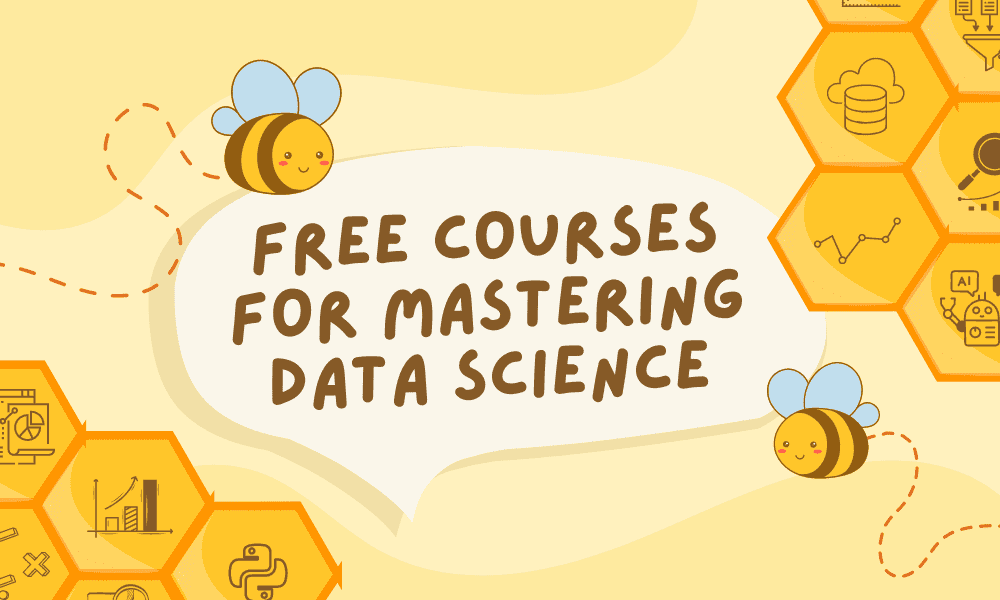
Image by Author
Learning from free courses can be highly beneficial for those seeking to enter the field of data science. Free courses offer numerous advantages such as cost-effectiveness, flexibility, access to the latest tools and concepts, opportunities to learn from industry experts, community support, and hands-on learning experience instead of spoon-feeding.
In this blog, my goal is to help you enhance your data science skills by providing a comprehensive list of free courses on various topics, including Python, SQL, data analytics, business intelligence, data engineering, machine learning, deep learning, generative AI, and MLOps.
Most of these courses are from top universities and platforms like Coursera, MIT, UC Davis, FreeCodeCamp, Google, Microsoft, IBM, Harvard, and Stanford Universities. So, start your journey of becoming a professional data scientist today!
Note: Coursera courses are available for free to audit, and if that option is not available, you can complete the courses during the trial period or ask for financial aid.
Python is a necessary programming language for data science. You will learn it for data manipulation, analysis, visualization, and machine learning. It offers a vast array of libraries and frameworks that simplify complex tasks, making it a popular choice among data scientists.
SQL (Structured Query Language) is a query language used to manage and manipulate relational databases, which are crucial for data storage, retrieval, and analysis.
As you may know, data analytics is a crucial aspect of data science that helps businesses make informed decisions based on data-driven insights. This involves using a variety of tools and techniques to extract meaningful information from data.
General data science courses cover a wide range of topics, from data manipulation to time series analysis and data modeling.
You can use Business Intelligence tools like Power BI or Tableau to transform raw data into actionable insights, which helps with decision-making. You don’t need to learn any other programming languages besides SQL.
Data engineering is the subfield of data science that deals with designing, building, and maintaining data pipelines and infrastructure.
Machine learning is a branch of artificial intelligence that involves creating algorithms capable of learning from data and making predictions. It is an essential skill for data scientists.
Deep learning is a subset of machine learning that focuses on neural networks with multiple layers. It is widely used in image and speech recognition, natural language processing, and other complex tasks.
Generative AI refers to the process of creating new content, such as text, images, and audio, by analyzing patterns and structures learned from existing data. In your learning process, you will mainly focus on Large Language Models, and how to train, fine-tune, and deploy them.
MLOps, short for Machine Learning Operations, is the process of automating and streamlining the deployment and management of machine learning models. Currently, it is one of the most in-demand career fields in the data science industry.
- Python Essentials for MLOps by Duke University
- MLOps for Beginners by Udemy
- Machine Learning Engineering for Production (MLOps) Specialisation by DeepLearning.AI
- MLOps bootcamp from DataTalks.Club
- Made With ML by Goku Mohandas
You don’t need to search Google to find high-quality courses on data. All you have to do is bookmark this page and start your journey with Python and SQL. In a few months, you will be able to ingest, process, analyze, and model data. After that, it will be a continuous learning journey. It is highly recommended to build your portfolio on GitHub or any other platform from the start if you want to get hired by top recruiters.
Check out the blog on “5 Free Platforms for Building a Strong Data Science Portfolio” to learn about other platforms and what they provide.
Abid Ali Awan (@1abidaliawan) is a certified data scientist professional who loves building machine learning models. Currently, he is focusing on content creation and writing technical blogs on machine learning and data science technologies. Abid holds a Master’s degree in technology management and a bachelor’s degree in telecommunication engineering. His vision is to build an AI product using a graph neural network for students struggling with mental illness.

